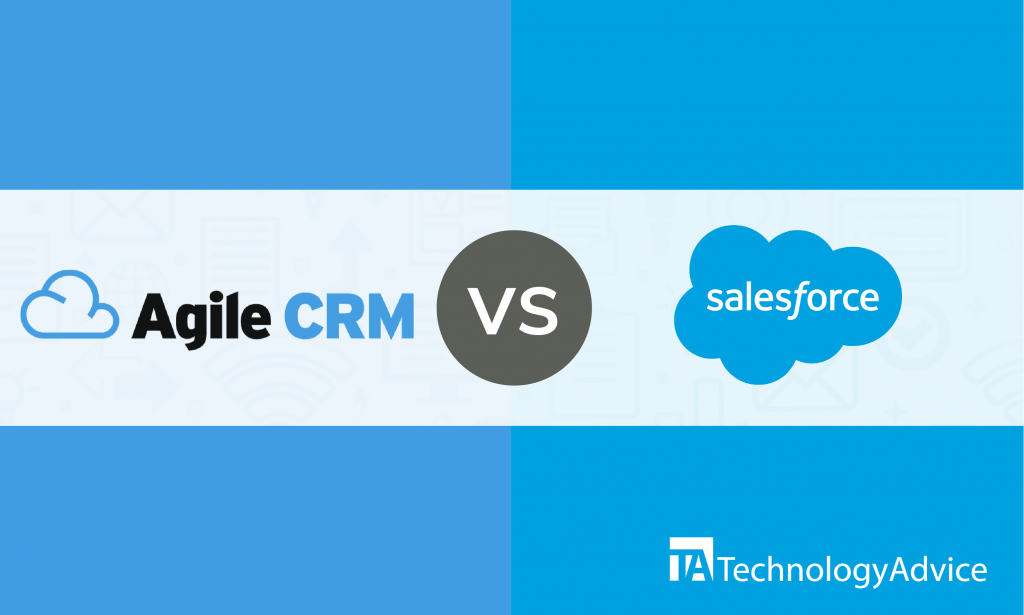- categoryCRM
- ContentComparison
Having a CRM that suits your business is one of the ways to stay competitive in the digital economy. A good productivity tool simplifies business processes — data management, marketing, sales, closing deals, customer service, and client retention.
The market is not lacking in customer relationship management platforms that offer a range of features. Two of them are Agile CRM and Salesforce. Both software options feature ad hoc CRM functionalities, but one presents better offers than the other.
Are you in search of a CRM that suits your business? Use our Product Selection Tool. We simplify your search process. Just enter your features, price, company size, and other user requirements, and we’ll send you a list of software options.
Agile CRM vs. Salesforce
Agile CRM is specifically designed for sales, marketing, and customer service — three main functionalities in a single CRM platform. Its uniqueness lies in affordability compared with other CRMs in the market.
Salesforce leads the CRM industry in revenue and market share. It offers customized CRM solutions to simplify the processes of all sizes of business — small, mid-sized, and enterprise, across all industries including retail, manufacturing, health sciences, and even public sector and nonprofit.
Read also: 4 Sales Gamification Ideas to Improve Performance
Marketing, sales, and customer service
Agile CRM integrates marketing and sales for a seamless transition between the two aspects of the business. It connects you to social media, manages your email marketing, provides analytics and customer insights, maximizes mobile marketing, and personalizes and tracks your communications.
To boost your sales, Agile CRM provides you the tools to manage your contacts, establish and close deals, track the stages and benchmarks, and more. It lets you manage your projects efficiently and effectively and gamify sales to get the desired results.
Salesforce also features these ad hoc CRM features: marketing and sales. It has tools for your marketing needs such as email marketing, lead scoring, segmentation, and quotes and proposals. It automates internal processes and connects information across channels for easy access.
With Salesforce, you can integrate all your applications and features easily and customize them to suit your marketing and sales needs. Salesforce links customer data, marketing, sales, and service for a seamless transition and interaction with customers.
Customer service
At the heart of a CRM is how your business connects with and retains your clients, which means customer service. With Agile CRM, its help desk enables your business to provide personalized customer service, receive feedback, and improve your customer relations. It helps you to understand your customers, prioritize tickets, and resolve customer queries. You can also empower your customers to help themselves with the platform’s self-service functionality.
Salesforce allows you to quickly respond to client needs and respond accurately with a complete customer view for a faster and reliable case resolution. The customers can engage proactively with the agents across multiple digital channels. They can reach you out through social, messaging, and chat. You can also scale up support service with Salesforce’s AI-powered chatbots and solutions.
CRM and analytics
Although Agile CRM features data analytics that is integrated with marketing, sales, and customer service, Salesforce has an edge on this aspect. With Salesforce, you can perform data analysis, forecast trends, and generate quick reports at scale.
Integrations
Agile CRM offers modern features and has great integrations with other tools and platforms for easy collaboration and implementation. Agile CRM optimizes the cloud with its cloud-based SaaS service providing mobility, speed, and ease of use. Its integrations include Twitter, Facebook, Google Apps, Twilio, RingCentral, LinkedIn, and more.
With Salesforce’s dashboard that delivers a simple and intuitive UI/UX, you can view and update the data anytime, anywhere on any mobile device. It gives you flexibility and mobility with its integrations. It integrates other productivity tools and third-party platforms such as Slack, Google Suite, Quickbooks, Jira, MailChimp, Dropbox, LinkedIn, DocuSign, and ActiveCampaign.
Which one is better for your business?
Deciding on a CRM can be hard, especially with the availability of many different options in the market. But it all boils down to the tool that gives you more confidence over the long term. If you’re seeking a platform that focuses on the three ad hoc CRM functions (sales, marketing, and customer service), Agile CRM might suit you. But for a more comprehensive solutions platform for your business, Salesforce is a force to reckon with. It is the best in the field, and there’s a reason why it leads the industry.
If you haven’t decided on a CRM platform yet, check out our Product Selection Tool. It streamlines your search, making it easy, fast, and free of charge.
